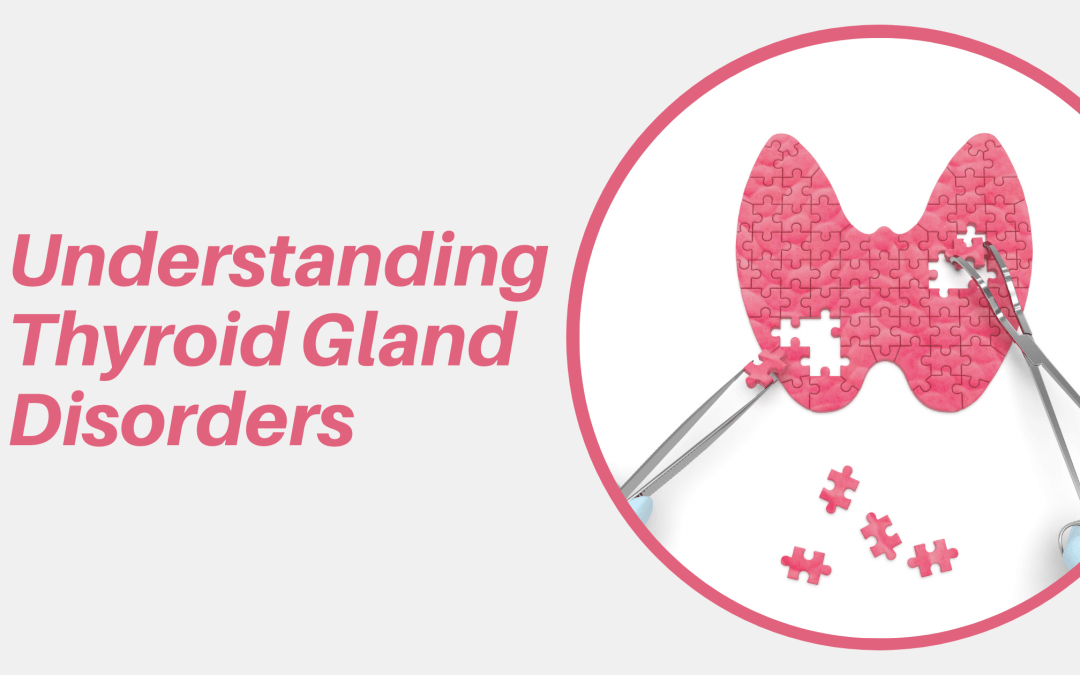It is estimated that 20 million people have a thyroid disorder. The thyroid gland is a crucial part of the endocrine system, which regulates various hormonal functions in the body. But according to the American Thyroid Association (ATA), up to 60% of people with thyroid disease are unaware they have the condition. Located in the front of the neck, the thyroid produces hormones that regulate the body’s metabolism. Metabolism refers to the process of converting nutrients (from what we consume) into energy needed to sustain the body. Thyroid disorders impact the production of these hormones which produces various symptoms and can lead to the development of other medical conditions if untreated.
Understanding the Thyroid
Although the thyroid glands are relatively small, the hormones they produce generate energy for the entire body. The thyroid maintains metabolism by producing T3 (triiodothyronine) and T4 (thyroxine) hormones. When the body requires more thyroid hormones, the thyroid glands increase their production to meet the demand. These hormones work together to inform the body’s cells of how much energy they need and as they are used, the thyroid gland produces more to regulate metabolic rate.
This process is managed by the pituitary gland which controls the number of thyroid hormones in the bloodstream. If there is a lack of hormones, the pituitary gland produces and releases thyroid stimulating hormone (TSH). This is sent to the thyroid gland to stimulate hormone production.
Types of Thyroid Gland Disorders
The ATA estimates that more than 12% of the population will develop a thyroid condition during their lifetime. Additionally:
- women are 5 -8 times more likely than men to experience issues with their thyroid gland
- 1 in 8 women will develop a thyroid disorder
Thyroid disease encompasses different types of thyroid gland disorders including the following:
- Hypothyroidism: the thyroid gland does not produce enough thyroid hormone
- Symptoms: fatigue, depression, muscle aches/pain, inability to concentrate, constipation, weight gain, dry skin, cold sensitivity
- Causes: inflammation of the thyroid gland which can be caused by autoimmune conditions or other factors. Iodine deficiency is a common cause of hypothyroidism, especially in regions with low iodine intake.
- An underactive thyroid leads to insufficient hormone production, causing various metabolic issues.
- Hyperthyroidism: the thyroid gland produces an excess of the thyroid hormone
- Symptoms: tremors, accelerated heart rate, increased bowel movements, weight loss, anxiety, sweating, muscle weakness, brittle hair and nails
- Causes: grave’s disease (an autoimmune disorder), excessive iodine intake, toxic multinodular goiter. An overactive thyroid, where the gland produces too much hormone, is a key characteristic of hyperthyroidism.
- Thyroid nodules: refers to lumps or masses on the thyroid gland. This can be caused by cysts and tumors that are benign. There can be one or several nodules on the thyroid which can also differ in size. An enlarged thyroid gland, or goiter, can also be associated with thyroid nodules.
- Thyroid cancer: there are different types of thyroid cancer which depends on the specific type of cells in the thyroid that becomes cancerous. Thyroid cancer is not as common and is typically treatable.
Thyroid disorders are often life-long conditions that people can effectively manage with medical treatment.
Diagnosis of Thyroid Hormone Levels
There are specific tests that are used to identify thyroid disorders. These specialized tests include:
- Blood Tests*:* involve taking a blood sample and analyzing the number of thyroid hormones in your blood. Blood tests measure thyroid hormone levels to determine if they are within the normal range. Blood tests are an effective way to identify hyperthyroidism and hypothyroidism.
- Imaging Tests*:* including a thyroid scan and/or ultrasound which provides images of your thyroid gland. Imaging tests can also assess the structure and composition of thyroid tissue to identify abnormalities. This allows your healthcare provider to assess the size, shape, growths that may be contributing to issues.
- Physical Exam*:* this is a simple and quick way to conduct some initiating testing. It involves your doctor feeling your neck to check for enlargement or inflammation of the thyroid.
Fortunately, these tests make it possible to readily diagnose thyroid disorders in straightforward ways.
Treatment with Thyroid Hormone Medications
Treatments depend on the specific thyroid disorder and can include:
- Medications*:* oral medications depend on whether there is an over or under production of the thyroid hormone. For:
- Hyperthyroidism*:* medication could include anti-thyroid drugs which stop the thyroid gland from making hormones, radioactive iodine effects thyroid cells which prevents excess hormone production, beta blockers (addresses symptoms). Treatments aim to reduce the production of too much thyroid hormone to alleviate symptoms.
- Hypothyroidism*:* thyroid replacement medications which are synthetic drugs that produce thyroid hormones.
- Surgery*:* if medications are not effective, your healthcare provider could recommend surgery. Surgery is also used if there is potential of thyroid cancer developing. The removal of the thyroid is referred to as thyroidectomy which can be performed in two ways: through an incision in the neck or an incision in the armpit. If the thyroid is removed, people have to take synthetic medications that produce the thyroid hormone.
These treatment options effectively manage thyroid disorders, preventing the development of further health concerns. Our ENT doctors are here to help. We provide comprehensive ear, nose, and throat services, including the diagnosis of thyroid gland disorders. Contact us today to schedule an appointment.

